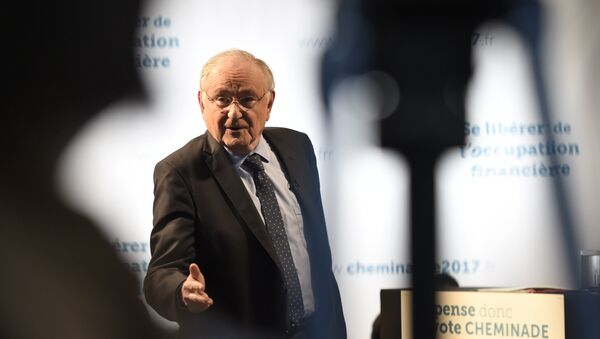"Contrary to the commitments taken after the destruction of the [Berlin] wall, NATO has enlarged to the east, extending its influence into regions where it should not have been present. In this context, I understand the position of the Russian government which claims that it is necessary to respond to the issue," Cheminade said.
The presidential candidate stressed that NATO was an obsolete organization which should no longer exist.
"I think we need to withdraw from [NATO], as there is no sense in its existence. It was created in response to the Warsaw Treaty Organization, which no longer exists, and there is no sense in the NATO existence," Cheminade added.
Moscow has expressed concerns over NATO's expansion to the east some time ago, stressing that it should be immediately stopped. Since 2014, after Crimea rejoined Russia, NATO has been increasing its military presence in Eastern Europe, using the countries’ vulnerability to alleged Russian aggression as a pretext. Moscow has repeatedly criticized the increased presence of the alliance’s troops and military facilities close to the Russian borders.
NATO has accused Russian hackers of intervening in the political affairs of different countries, while the alliance itself has done the same by turning to hackers to influence public opinion, French presidential hopeful Jacques Cheminade told Sputnik, adding that such practices should be ceased.
"There are networks within NATO that use various techniques. The Russian hackers are often accused nowadays of influencing politicians, which is partly true. But it is necessary to add that, in my opinion, NATO is doing the same… This should be stopped," Cheminade, who is the founder of the Solidarity and Progress party (Solidarite et Progres), said.
He pointed out that there were numerous special groups, such as Cambridge Psychometrics Center and Cambridge Analytica, that were engaged in such activities.
"We are talking about changing behavior of large groups, they are modeling people, change their beliefs – this is a so-called cognitive war," Cheminade said.
The presidential hopeful pointed out that attempts to influence the public's opinion began with the study of consumers' preferences before spreading to the sphere of politics.
The 2016 US presidential elections were followed by allegations from the outgoing US administration that Russia may have meddled in the election. In January, the US Intelligence Community presented a report claiming that such interference took place, albeit without proving proof. Shortly afterwards, the leaders of Germany and Sweden said that interference in their elections could not be ruled out.
Moscow has repeatedly denounced the allegations, with Russian Foreign Minister Sergey Lavrov calling such accusations "groundless" and pointing out that no evidence existed of Russian interference in the internal affairs of the United States, Germany, France or the United Kingdom.
The first round of presidential election in France is set for Sunday. According to Tuesday's OpinionWay poll, independent candidate Emmanuel Macron is projected to win the first round with 23 percent of votes, while far-right nominee Marine Le Pen is expected to come second with 22 percent. Cheminade himself is not seen as the main contender.
Never miss a story again — sign up to our Telegram channel and we'll keep you up to speed!



